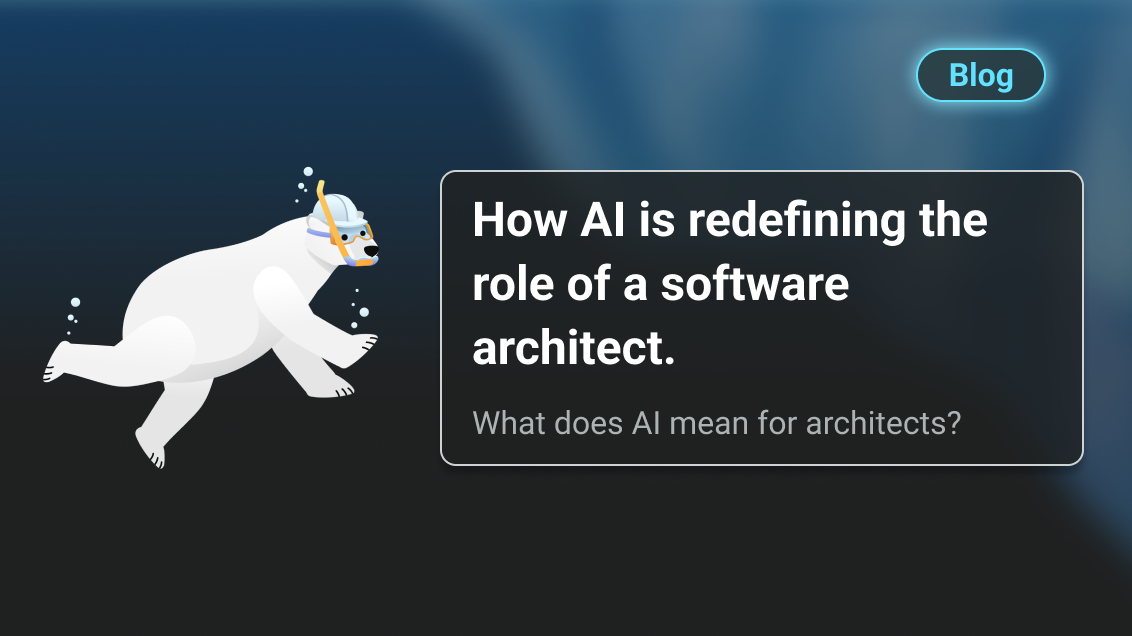How AI is redefining the role of a software architect.
There’s been ongoing discussion about AI making software engineers obsolete. But what about software architects? What kind of impact does AI have on software architecture as a whole? That’s what we’ll get into👇
Introduction
AI has been making significant changes in the tech space. Investors are interested in AI innovation and are investing in AI startups. We’re seeing AI boosting developer productivity, and non-technical individuals building apps using vibe coding, a term coined by Andrej, the co-founder of OpenAI, to describe expressing ideas to Large Language Models (LLMs) to generate code.
State of Software Architect
As we covered in a previous blog What Does a Software Architect Do, the role of a software architect is to make architectural decisions, regularly review their architecture, and stay up-to-date with the latest technologies.
The default state of architects is to continuously invest in their technical breadth, building knowledge around new tools and design patterns other architects use, and contributing to the tech stack software engineers rely on for design and implementation.
Large Language Models (LLMs) sit at the heart of AI. They are generative models trained to predict the next character based on the current text. LLMs have increasingly improved at generating content, getting better at reasoning and replication. Every day, new tools are created on top of the most recent LLMs to solve specific problems. Designing architecture diagrams is one use case that doesn’t have a clear winner (yet).
Impact of AI on Software Architects
The impact of AI on software engineers or developers is more visible than on architects. Tools like Cursor, Replit, and Windsurf can generate full-stack web apps that are deployable within minutes. These AI tools are quite good at coding tasks, some even refer to these tools operating like mid-level software engineers.
However, the impact on architects is quite different.
📈 On the Positive Side: Why Architects Aren’t Going Anywhere
AI cannot make architects obsolete (or at least not nearly as much as junior developers).
There are two reasons for that:
1) LLMs are good at replication, not novelty
LLMs are pre-trained on existing datasets. They’re good at producing architectures they’ve seen before and generating “cookie-cutter” solutions that architects and engineers can follow.
But how often do engineers actually use cookie-cutter solutions? 😅
LLMs can design the architecture for common real-world systems, such as e-commerce systems, inventory tracking apps, gaming apps, and messaging apps. However, when given a more unique challenge like designing cryptocurrency exchange or real-time fraud detection system, they often fall short. These systems involve complex domain-specific requirements, trade offs, regulations, sensitive data, and moving pieces that go beyond what LLMs have seen in public data. These systems are the kind of problems where the experience and judgement of software architects are essential.
LLMs cannot produce novel ideas, they are good at imitation. So it’s important to audit and challenge their outputs before accepting their suggestions at face value. Most of the time, they’re trying to give you a cookie-cutter solution, which often isn’t what you need.
However, software architects can produce novel ideas, drawing from their experience with production systems and deep understanding of their business and domain context.
2) LLMs design “Ideal” architecture
LLMs operate in a “perfect world”. They generate clean, modular, and well-documented architectures that assume every actor behaves as expected. They assume the end users follow normal usage patterns and that business requirements are stable and predictable. They even assume the business has a limitless budget 💸. LLMs struggle to design pragmatic or customized solutions that are imposed by specific product requirements or resource constraints.
That’s why the role of software architects is essential. They are key decision makers who:
- Have broad exposure and experience designing systems.
- Bring in business domain knowledge across one or more fields.
- Have interpersonal skills and can navigate organizational dynamics.
Adding these strengths to their technical skill set makes architects uniquely valuable in the job market, and not replaceable by AI.
📉 On the Less Positive Side: More Responsibility
Interest in AI has grown exponentially in recent years, and businesses are eager to integrate AI into their software. This puts additional responsibility on architects to evolve their software architectures to support running data-intensive workloads and integrate with LLMs.
Architects also need to understand the unique challenges of working with LLMs, like hallucinations, and how to mitigate them effectively.
Does this put the architect role at risk? Most likely not, but they do need to upskill themselves by working with AI-powered systems.
🔮 How Can Architects Prepare for the Future?
AI cannot make software architects obsolete, but it can make them more productive. And that is the skill needed for the future. Software Architects must develop the ability to leverage AI tools effectively, and get answers or solutions quickly (much like searching on Stack Overflow).
This includes using tools like:
Architects should also experiment with emerging AI tools, whether through side projects or company-wide hackathons. This means using AI to generate technical diagrams, generate documentations, or automate workflows.
This includes things like:
- Experimenting with AI agents (e.g. Anthropic Agents)
- Exploring MCP servers (P.S. We released our MCP Server at IcePanel)
- Trying out AI solutions from cloud providers (e.g., AWS, Azure, GCP)
- Keeping an eye on latest AI research, e.g. OpenAI Research
All this to say, AI is going to redefine the role of the software architect into something better. It will unlock new capabilities for architects and give them more time for deep focus, empowering them to make better design decisions for their software architecture.
What are your thoughts about AI impact on architects? Do you think it has changed much on how they operate? Let us know what you think!
